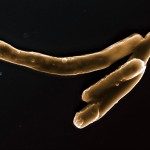Lien vers Pubmed [PMID] – 22377718
Genome Res. 2012 Apr;22(4):721-34
Many of the most virulent bacterial pathogens show low genetic diversity and sexual isolation. Accordingly, Mycobacterium tuberculosis, the deadliest human pathogen, is thought to be clonal and evolve by genetic drift. Yet, its genome shows few of the concomitant signs of genome degradation. We analyzed 24 genomes and found an excess of genetic diversity in regions encoding key adaptive functions including the type VII secretion system and the ancient horizontally transferred virulence-related regions. Four different approaches showed evident signs of recombination in M. tuberculosis. Recombination tracts add a high density of polymorphisms, and many are thus predicted to arise from outside the clade. Some of these tracts match Mycobacterium canettii sequences. Recombination introduced an excess of non-synonymous diversity in general and even more in genes expected to be under positive or diversifying selection, e.g., cell wall component genes. Mutations leading to non-synonymous SNPs are effectively purged in MTBC, which shows dominance of purifying selection. MTBC mutation bias toward AT nucleotides is not compensated by biased gene conversion, suggesting the action of natural selection also on synonymous changes. Together, all of these observations point to a strong imprint of recombination and selection in the genome affecting both non-synonymous and synonymous positions. Hence, contrary to some other pathogens and previous proposals concerning M. tuberculosis, this lineage may have come out of its ancestral bottleneck as a very successful pathogen that is rapidly diversifying by the action of mutation, recombination, and natural selection.



